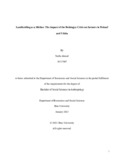| dc.contributor.advisor | Rahman, Dr. Shahidur | |
| dc.contributor.author | Ahmed, Tasfia | |
| dc.date.accessioned | 2024-01-10T06:47:21Z | |
| dc.date.available | 2024-01-10T06:47:21Z | |
| dc.date.copyright | 2023 | |
| dc.date.issued | 2023-01 | |
| dc.identifier.other | ID: 19117007 | |
| dc.identifier.uri | http://hdl.handle.net/10361/22103 | |
| dc.description | This thesis is submitted in partial fulfillment of the requirements for the degree of Bachelor of Social Science in Anthropology, 2023. | en_US |
| dc.description | Cataloged from PDF version of thesis. | |
| dc.description | Includes bibliographical references (pages 103-106). | |
| dc.description.abstract | Most cohesion and host community reports regarding the Rohingya crisis frequently mention the
adversities faced by farmers as a result of the mass exodus, even though their adversities are discussed
vaguely, with farmers being discussed as if they are a monolithic group. The objective of this study was to
analyse the relationship between a farmer's class and the adversities they have faced as a result of the
Rohingya crisis. For data collection, six focus groups were conducted throughout different regions in
Teknaf and Ukhia, and two key persons working with host community members were interviewed.
Research on neoliberalism and its effects on farming classes were used as a frame of reference, and
theories regarding alienation by Shapan Adnan and differentiation by Atiur Rahman were used to analyse
the data. The findings illustrated that not only did the farmers' class category play a role in the adversities
they faced and the coping strategies they relied on, but it also played a role in enabling processes of
differentiation and elite accumulation in the area. The findings also showed that there were some
similarities between the effects of neoliberalism on peasant classes and that of the Rohingya crisis,
including processes of class differentiation and indirect elite accumulation, even though the root causes of
the two issues differed. The findings of this study can contribute to literature regarding the Rohingya
crisis, peasant class structures, and the effects of refugee influxes on developing countries. | en_US |
| dc.description.statementofresponsibility | Tasfia Ahmed | |
| dc.format.extent | 110 pages | |
| dc.language.iso | en | en_US |
| dc.publisher | Brac University | en_US |
| dc.rights | Brac University theses are protected by copyright. They may be viewed from this source for any purpose, but reproduction or distribution in any format is prohibited without written permission. | |
| dc.subject | Rohingya crisis | en_US |
| dc.subject | Farmers | en_US |
| dc.subject | Impact | en_US |
| dc.subject.lcsh | Rohingya (Burmese people)--Relocation--Bangladesh--Cox's Bāzār District. | |
| dc.subject.lcsh | Refugees--Bangladesh. | |
| dc.subject.lcsh | Cox's Bāzār District (Bangladesh)--Social conditions. | |
| dc.title | Landholding as a lifeline: The impact of the Rohingya Crisis on farmers in Teknaf and Ukhia | en_US |
| dc.type | Thesis | en_US |
| dc.contributor.department | Department of Economics and Social Sciences, Brac University | |
| dc.description.degree | BSS in Anthropology | |

